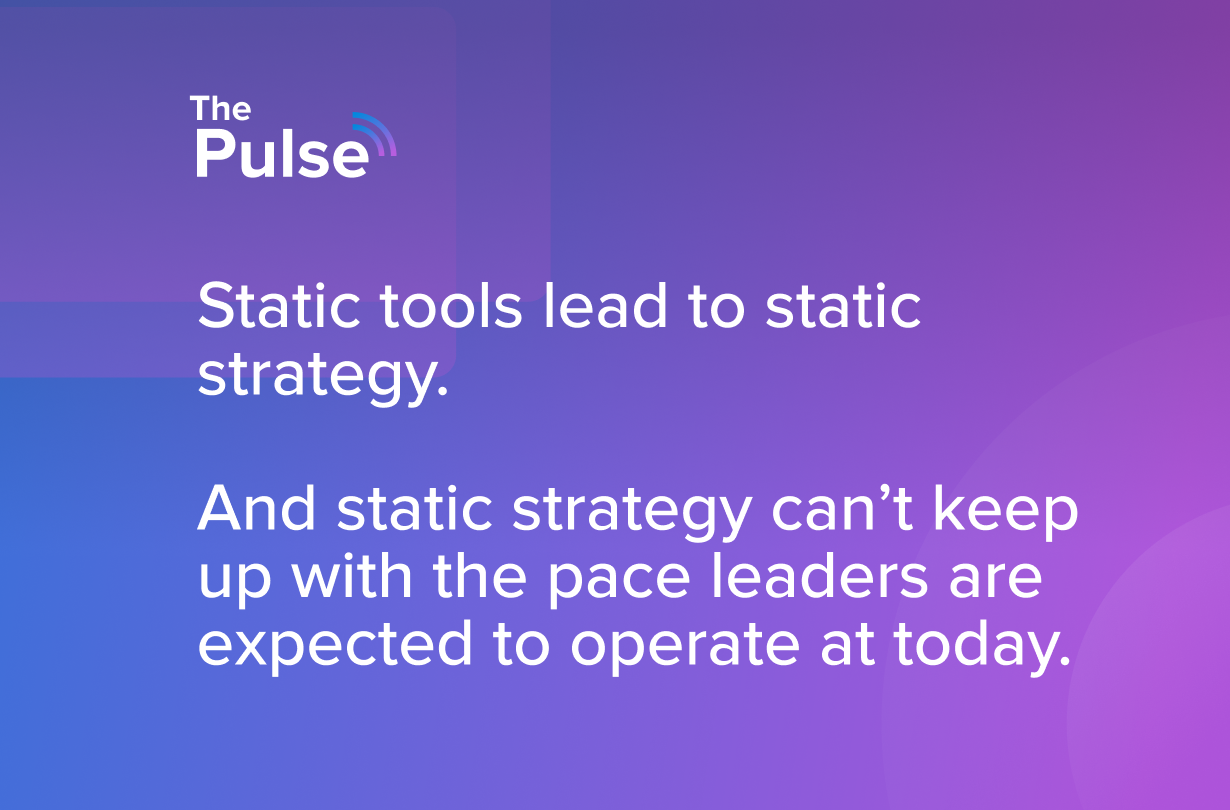.png)
This article is the second of a two part series on how we have adjusted our product strategy and processes at Elate. With this massive challenge and change for the world and economy, we have been evaluating what adjustments we should make with our company and product strategy.
For context, Elate is a B2B Operations platform that helps teams drive company-wide engagement for OKRs and goals, measures results real-time through integrations, and powers data-driven business decisions.
This series will cover two topics related to how we adjusted our product strategy and processes:
- Our Observations
- Actions We Took
Part 2 - Actions We Took
In the previous article of this series, we shared observations our company had about the current market conditions. Now let’s talk about what we actually did with those observations.
After we took a step back to identify what has changed for our company and product team, we identified three ways to refocus our team:
- We updated our quarterly and monthly goals.
- We identified new growth opportunities with a free product.
- We improved our internal product processes.
Action 1: We Updated Our Quarterly and Monthly Goals
Goals, as well as metrics around those goals, are critically important for team alignment. We use the OKR (Objectives and Key Results) framework to track progress as a team. With how much the market landscape has changed in the past month, we decided to revisit our product OKRs to ensure we were all marching in the same direction.
We were originally planning on a new product launch mid-April. We also had goals to conduct dozens of user interviews and surveys. We changed our goals based on what we heard and noticed in the market.
We decided to advance other initiatives as a product team, which I’ll cover in more detail with the next two actions we took.
Action Your Product Team Can Take:
Think about how the market has shifted and how that impacts your industry. Adjust your product team’s OKRs and goals accordingly.
Action 2: We Identified New Growth Opportunities with a Free Product
Executives and department heads are experimenting with new products and trying new strategies. Companies are looking for guidance on how to adjust to remote work, but they don’t all have a lot of purchasing power.
We realized this trend and wondered how we could find new growth opportunities for our company. Like all companies right now, we still want to grow our business and stay relevant. However, we understand that cold outreach and typical sales playbooks do not work the same as they had in the past.
Because of these changes, our team used the following questions to think about our product strategy:
- What can we do to provide immediate value to our prospects and customers?
- Our product-vision caters towards team alignment and collaboration, which is what people need right now; how can we share this value of collaboration and alignment from our product more universally to make life easier for people during this difficult time?

After thinking through those questions, we limited ourselves to a new growth opportunity with the following constraints:
- This product needs to be free.
- This product needs to help people collaborate on goals and create remote alignment.
- This product needs to be built quickly, so our roadmap and company strategy are not completely disrupted.
- This product should educate prospects on what Elate does.
We are hopeful that giving people value now with this free product will pay off in the long run. Is it a gamble? Absolutely. But we are willing to take that gamble because it is the right thing to do.
And to be completely transparent, we are starting to see some encouraging early results. We have 60+ teams that have signed up for our product. Our website traffic in the past week already beat last month’s total traffic. We have seen an increase in our LinkedIn followers by 45% in one week, which also led to several demo requests for our main product. While these metrics are not immediate revenue, the early numbers are encouraging. And we are thrilled with the personal and professional impact our product is having on teams that have signed up.
Action Your Product Team Can Take:
Think about how your company and product are uniquely positioned. Evaluate if you can add value to your audience quickly with a free or freemium product.
Learn more about our free product and sign up for a free account here.
Action 3: We Improved Our Internal Product Processes
With our original OKRs, we focused on tasks reliant on a third party. We decided to shift the focus of our new OKRs on projects that don’t rely on as much time commitment from others.
While we can’t get feedback from customers and prospects as easily right now, that doesn’t mean that we can’t complete value adding tasks. Some examples of internal projects that we are focusing on include:
Project 1 - Round out and put more emphasis on your product metrics.
While talking to your users is harder now, that doesn’t mean you can’t learn from their behavior. Now is a great time to build metrics in your product analytics tools, or to really analyze the data if you already have this process set up well. Learn from your hard data about user action, as well as user inaction.
Project 2 - Conduct a competitive analysis.
Now is the time to get back up to speed on your industry and who you are competing with. Research competitor strengths and weaknesses to adjust your product strategy to what your company is uniquely positioned to build and sell. While it is a best practice to always know your competition, now is a good time to evaluate if your research is up to date.
Project 3 - Implement processes and structure to optimize digital collaboration tools.
We no longer have our regular water cooler conversations or in person standups. Because of this, we have put more of an emphasis on our remote collaboration tools. Tools we are emphasizing to keep our team efficient include our own Operations Platform (for managing OKRs, tracking metrics, and running meetings), Clubhouse, Figma, Whimsical, and Airtable.
Action Your Product Team Can Take:
Think about initiatives you can advance that don’t rely on third parties. Many of these initiatives are incredibly value adding, but have been deprioritized due to the time normally spent on user interviews.
How Have You Been Adjusting?
While these adjustments have worked for us, every company is different. We’d love to hear from you about how you and your team are adjusting. Let’s learn from each other and keep moving the ball forward. We are in this together.
If you are looking to implement OKRs in your business, reach out to us today to learn how we have helped some of the fastest growing companies accelerate their business with OKRs.


